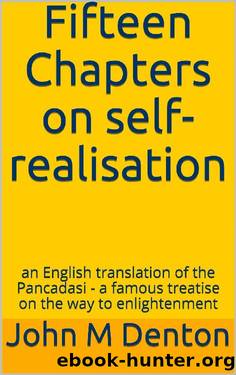Fifteen Chapters on self-realisation: an English translation of the Pancadasi - a famous treatise on the way to enlightenment by John M Denton

Author:John M Denton [Denton, John M]
Language: eng
Format: epub
Publisher: UNKNOWN
Published: 2018-10-10T18:30:00+00:00
Chapter 12 - The Bliss of the Self
12.1 Question: A yogin may indeed enjoy his own natural bliss (the bliss of the Self), which is different from the bliss of latent impressions and the bliss of deep sleep but what about the state of the ignorant?
12.2 Reply: The ignorant are born and die again and again in countless bodies due to the effects of their virtuous or unrighteous actions. What would be the point of our sympathy for them?
12.3 Suggestion: In order to help them something might be done. Reply: In that case you must find out whether they are eager to learn or averse to it. 12.4 Those who turn away from the teaching and are devoted to action may be prescribed paths of worship, adoration. Others who may be spiritually dull but eager to learn should through instruction be awakened by the bliss of the Self. 12.5 YÄjñavalkyaḥ told his beloved wife MaitreyÄ«, for the purpose of instruction, that âit is not for the sake of the husband, my dear, that he is loved but for the sake of the Selfâ.
12.6 Husband, wife, son, wealth, animals, priestliness, noble warriorness, worlds, gods, the Vedas - all are beloved for the sake of the Self.
12.7 A wife shows affection when she desires her husband and the husband responds except when he is suffering from disease, infirmity, hunger and so on.
12.8 Her love is not for the sake of her husband but for her own sake and her husbandâs love is for the sake of his own Self and never for the sake of his wife.
12.9 Thus even in mutual love between husband and wife the motivation is oneâs own desire for happiness.
12.10 A child may cry when kissed by a father with a prickly beard but the father is not kissing for the childâs sake but for his own. 12.11 Jewels, wealth and the like are without desires of their own but their owner looks after them with love and care for his own sake and none suppose otherwise.
12.12 A merchant leads his unwilling bullock by force. He loves the bullock for his own sake. Why would it be for the sake of the bullock?
12.13 A man of priestly rank who deserves respect is satisfied through respect. This complete satisfaction is not due to his position assigned by caste, which is just an abstract title but is earned by the man alone.
12.14 It is said that a person of a royal family feels like a ruler because he is of the Ká¹£atriya caste but the rulership does not extend to the caste. The same applies to the family of a man of the VaiÅya (merchant) or other castes.
12.15 Wishing âMay I attain the realm of heaven or the world of BrahmÄâ is not for the benefit of the worlds but for oneâs own enjoyment alone. 12.16 People worship ĪÅvara, Viá¹£á¹u and other deities in order to destroy sin but this is not for the sake of the deities for they are already without sin but for their own sake.
Download
This site does not store any files on its server. We only index and link to content provided by other sites. Please contact the content providers to delete copyright contents if any and email us, we'll remove relevant links or contents immediately.
Predicting Your Future through Astrology by Sita Ram Singh(506)
The Practice of Classical Palmistry by Madame la Roux(428)
How to Be Your Own Therapist by Owen O'Kane(418)
Magic of Isis: A Powerful Book of Incantations and Prayers by Alana Fairchild(363)
2021 Quantum Human Design Evolution Guide by Karen Curry Parker(330)
Yoga for Beginners: Your Natural Way to Strengthen Your Body, Calming Your Mind and Be in The Moment (Yoga Poses) (A Better You Book 1) by Susan Mori(310)
Writing Guide for Memorandum of Understanding by unknow(301)
Christmas Witch (Hot Hex 3) by Susan Stephens(284)
Tarot de Marseille by Marius Høgnesen & Paul Marteau(273)
Africa's Diabolical Entrapment: Exploring the Negative Impact of Christianity, Superstition and Witchcraft on Psychological, Structural and Scientific Growth in Black Africa! by Larr Frisky(270)
Learn Cold Reading: The real secret of mind readers by Reynolds Ethan(268)
Shadow Worlds by Andrew Wood(267)
Design Guide to Learn Calligraphy: Fonts, Styles, Pens, Letters, & Numbers by Agatha Adams(261)
The Stuff of Dreams by Edward Lucas White(256)
The Enfield Poltergeist Tapes: One of the most disturbing cases in history. What really happened? by Melvyn J. Willin(253)
The Watkins Tarot Handbook by Naomi Ozaniek(252)
Miracle Minded Manager by John Murphy(244)
The World's Most Mysterious Objects by Patricia Fanthorpe & Patricia Fanthorpe(234)
Witch: A Magickal Journey by Fiona Horne(233)
